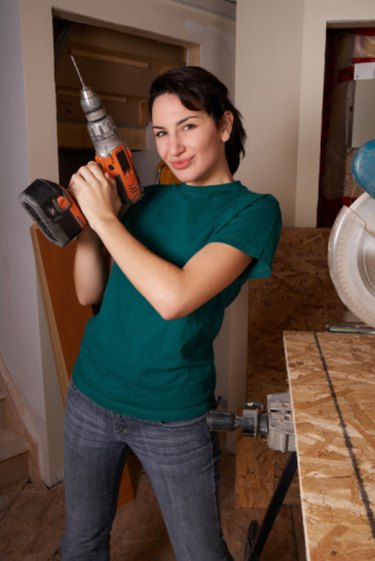Things You'll Need
Tape measure
Drill
Mason's rotary bit
Joist hanger
1 3/4 inch concrete screws
1 1/4 inch treated deck scews
Phillips screw bit

A joist hanger is a metal bracket, designed to attach the end of a rafter, or joist to a perpendicular beam, or to an existing wall. The bracket is attached by driving fasteners through the holes in flat tabs on either side of the three sided "pocket" or seat, for the joist. Joist hangers can be attached to brick in much the same way they are attached to wood surfaces, with the exception of the hardware used to make the connection. A concrete screw is the simplest fastener available for the job.
Attaching the Hanger
Step 1
Measure the joist end's height and position horizontally along the wall, using a tape measure. Mark the position of the joist hanger's left side by marking the screw holes through the bracket onto the face of the brick.
Video of the Day
Step 2
Fit a 3/16 inch rotary mason's bit into your drill's chuck and tighten it. Drill a hole for each of the marks, 2 inches deep in the face of the brick. Blow the dust from each hole for a proper fit.
Step 3
Align the joist hanger so that the holes match up to the holes in the wall. Drive one 1 3/4 inch tapcon-style concrete screw through each hole, using a cordless drill and a properly-sized phillips screw bit tip.
Fitting the Joist
Step 1
Fit the end of the joist into the joist hanger, with one narrow edge down, so that the hanger fits up and around the two faces. Push the right tab of the hanger up against the face of the joist and mark the holes onto the brick.
Step 2
Release the tab so that the bracket can open up and lift the joist out of it.. Push the tab to the right, clear of the marked spots and drill holes on each marked spot.
Step 3
Set the joist back into the hanger and push the right side of the hanger up against the joist as you did when marking the holes. Drive one screw through each hole in the joist hanger as you did for the left tab.
Step 4
Drive one 1 1/4 inch treated concrete screw through each of the two holes on either side of the joist hanger, so that they angle into the board, and hold it secure in the joist hanger.
Video of the Day